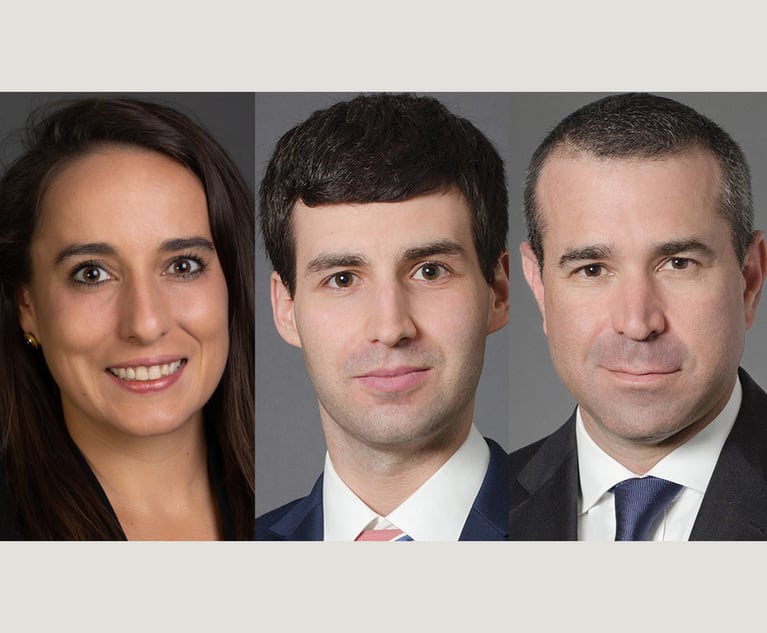Alston & Bird Settles Multimillion-Dollar Legal Mal Suit
The complaint alleged that the firm caused a onetime employee of the widow of late Coca-Cola CEO Roberto Goizuega to lose tens of millions of dollars in gifts and bequests from Olga Goizuega and cost her millions more in tax judgments and fines.
April 19, 2018 at 07:32 PM
5 minute read
The original version of this story was published on Daily Report

Alston & Bird has reached a confidential settlement in a legal malpractice suit that sought tens of millions of dollars by a former employee and confidante of the late Olga Goizueta, widow of former Coca-Cola chairman and CEO Roberto Goizueta.
The complaint, filed in Fulton County Superior Court in 2016, said Alston & Bird had handled the affairs of both Olga Goizueta and plaintiff Katherine Stearns prior to Goizueta's death in 2015. Roberto Goizueta died in 1997, leaving an estate worth over $1 billion.
Then, Stearns said, in an effort to ingratiate itself with Goizueta's children, the firm used its knowledge of the women's affairs to orchestrate “sham” investigations into millions of dollars in gifts and bequests the wealthy widow gave her.
Stearns' suit sought more than $35 million, including $10 million in gifts she was forced to return, and $25 million in bequests that were revoked before Goizueta's death as the result of the firm's actions.
She also said she lost $3.2 million due from a termination agreement, and spent more than $1 million in legal fees fighting the Internal Revenue Service and litigating a suit Goizueta filed against her in DeKalb County that was dismissed with prejudice in 2013.
She also blamed the firm for an Internal Revenue Service assessment for nearly $8 million in taxes and penalties.
On April 11, Judge Shawn LaGrua entered an order saying the parties settled the case during mediation on March 29.
Stearns was represented by Atlanta solo Bruce Brown, and Andrew Beal and Nicholas Smith of Buckley Beal. Brown said he did not have permission to discuss the case.
Alston & Bird was represented by Thomas Curvin, Melissa Fox and Amanda Griffin of Eversheds Sutherland. Neither they nor Alston & Bird general counsel Steven Collins responded to requests for comment.
Collins previously said the firm owed no duty to Stearns when the lawsuit was filed.
“Ms. Stearns alleges that our firm breached duties to her by investigating her conduct as an employee of a firm client, and by pursuing claims against her on behalf of that client. We deny any liability,” said Collins at the time.
According to the complaint, Stearns was a high-level employee with the Atlanta Archdiocese in 2006 when Goizueta hired her to “assist with the coordination of her advisers, and her everyday professional and personal needs.”
Goizueta reportedly showered Stearns with gifts and bequests, and she retained Alston & Bird to manage her own estate and legal affairs. Until 2012 the firm oversaw multiple transactions between Goizueta and Stearns.
Goizueta often funneled her gifts of money, property and construction work through a contractor to keep her children from finding out about them, the complaint said.
When the heirs found out about the arrangement, “rather than standing up and acknowledging that it knew of the gifts and that they were proper,” Alston & Bird accused Stearns and the contractor of embezzling the funds.
That tactic allowed Alston & Bird to claim it had no knowledge of the transfers, and thus failed to advise Goizueta to pay gift taxes on them.
In July 2012, an Alston & Bird partner escorted Stearns out of Goizueta's home and told her she was being suspended pending an audit and investigation. Alston & Bird filed the DeKalb County action on Goizueta's behalf the next month.
Stearns' just-dismissed suit included claims for breach of fiduciary duty, professional negligence, negligent misrepresentation, conversion, tortious and intentional interference with contract and economic expectancy and fraud.
The Goizuetas' bequests have spawned other litigation as well. Last month, the Georgia Court of Appeals splintered in a case involving claims by 14 people who worked for them. They claim that two Goizueta children improperly forced Olga Goizueta to change a trust document so that it eliminated her intention to bequeath about $5.4 million to the ex-workers.
On March 16, the Georgia Court of Appeals voted 10-4 largely in favor of the Goizueta children, upholding a provision in a trust created by Olga Goizueta that forfeits any allotment for a beneficiary who challenges the validity of the trust.
A majority of states void such “in terrorem” or “no contest” provisions when beneficiaries have probable cause to claim something in the trust is amiss, one dissenting judge wrote.
But the majority ruled that Georgia state law allows such clauses to be enforced.
This content has been archived. It is available through our partners, LexisNexis® and Bloomberg Law.
To view this content, please continue to their sites.
Not a Lexis Subscriber?
Subscribe Now
Not a Bloomberg Law Subscriber?
Subscribe Now
NOT FOR REPRINT
© 2025 ALM Global, LLC, All Rights Reserved. Request academic re-use from www.copyright.com. All other uses, submit a request to [email protected]. For more information visit Asset & Logo Licensing.
You Might Like
View All
How a Kirkland Partner Relied on 2 Lean Teams During Simultaneous Weeklong Arbitrations on Either Coast

Selendy Gay Elsberg's Rajat Rana Aims to Bring Some Trial Lawyer Approaches to Investment Treaty Arbitration

Litigator of the Week: King & Spalding Wins $1B-Plus Construction Arbitration Award for Colombian Oil Refinery

International Arbitration Expert by Day. Thriller Author by Flight.
Trending Stories
Who Got The Work
J. Brugh Lower of Gibbons has entered an appearance for industrial equipment supplier Devco Corporation in a pending trademark infringement lawsuit. The suit, accusing the defendant of selling knock-off Graco products, was filed Dec. 18 in New Jersey District Court by Rivkin Radler on behalf of Graco Inc. and Graco Minnesota. The case, assigned to U.S. District Judge Zahid N. Quraishi, is 3:24-cv-11294, Graco Inc. et al v. Devco Corporation.
Who Got The Work
Rebecca Maller-Stein and Kent A. Yalowitz of Arnold & Porter Kaye Scholer have entered their appearances for Hanaco Venture Capital and its executives, Lior Prosor and David Frankel, in a pending securities lawsuit. The action, filed on Dec. 24 in New York Southern District Court by Zell, Aron & Co. on behalf of Goldeneye Advisors, accuses the defendants of negligently and fraudulently managing the plaintiff's $1 million investment. The case, assigned to U.S. District Judge Vernon S. Broderick, is 1:24-cv-09918, Goldeneye Advisors, LLC v. Hanaco Venture Capital, Ltd. et al.
Who Got The Work
Attorneys from A&O Shearman has stepped in as defense counsel for Toronto-Dominion Bank and other defendants in a pending securities class action. The suit, filed Dec. 11 in New York Southern District Court by Bleichmar Fonti & Auld, accuses the defendants of concealing the bank's 'pervasive' deficiencies in regards to its compliance with the Bank Secrecy Act and the quality of its anti-money laundering controls. The case, assigned to U.S. District Judge Arun Subramanian, is 1:24-cv-09445, Gonzalez v. The Toronto-Dominion Bank et al.
Who Got The Work
Crown Castle International, a Pennsylvania company providing shared communications infrastructure, has turned to Luke D. Wolf of Gordon Rees Scully Mansukhani to fend off a pending breach-of-contract lawsuit. The court action, filed Nov. 25 in Michigan Eastern District Court by Hooper Hathaway PC on behalf of The Town Residences LLC, accuses Crown Castle of failing to transfer approximately $30,000 in utility payments from T-Mobile in breach of a roof-top lease and assignment agreement. The case, assigned to U.S. District Judge Susan K. Declercq, is 2:24-cv-13131, The Town Residences LLC v. T-Mobile US, Inc. et al.
Who Got The Work
Wilfred P. Coronato and Daniel M. Schwartz of McCarter & English have stepped in as defense counsel to Electrolux Home Products Inc. in a pending product liability lawsuit. The court action, filed Nov. 26 in New York Eastern District Court by Poulos Lopiccolo PC and Nagel Rice LLP on behalf of David Stern, alleges that the defendant's refrigerators’ drawers and shelving repeatedly break and fall apart within months after purchase. The case, assigned to U.S. District Judge Joan M. Azrack, is 2:24-cv-08204, Stern v. Electrolux Home Products, Inc.
Featured Firms
Law Offices of Gary Martin Hays & Associates, P.C.
(470) 294-1674
Law Offices of Mark E. Salomone
(857) 444-6468
Smith & Hassler
(713) 739-1250






